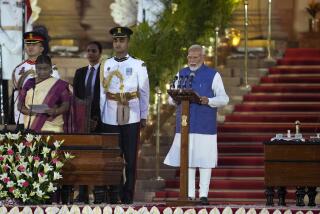Gandhi Reelected Leader of Party
- Share via
NEW DELHI — Sonia Gandhi was unanimously reelected as parliamentary leader of her Congress Party on Saturday, moving the Italian-born politician closer to making history as the first person of foreign origin to serve as prime minister of the world’s largest democracy.
After the vote, Gandhi immediately took aim at Hindu nationalists who called her a foreigner unfit to govern India. She said that the nation’s voters had rejected such arguments when she and her party’s allies won a surprise victory Thursday over Prime Minister Atal Behari Vajpayee and the National Democratic Alliance, which is led by his Hindu-nationalist Bharatiya Janata Party.
Gandhi, the widow of assassinated Prime Minister Rajiv Gandhi, said Indian voters turned against Vajpayee and his allies because of failed policies as well as personal attacks.
During the election campaign, some of Vajpayee’s leading supporters argued that Gandhi, an Indian citizen, shouldn’t be prime minister because she wasn’t born here.
But Indian voters, she said, “decisively rejected the politics of arrogance, of personal attacks and negative campaigning.”
If Gandhi becomes prime minister as expected, continuing friction with Hindu nationalists could affect one of the most pressing matters on the new government’s agenda: landmark peace talks with Pakistan.
Pressure from Hindu hard-liners may make it more difficult for her to agree to, and then sell to India’s people, the concessions that Pakistani President Pervez Musharraf is seeking to resolve the almost 57-year conflict over the disputed territory of Jammu and Kashmir.
However, it would appear hypocritical for Hindu nationalists who brought Vajpayee to power to attack Gandhi for carrying on the peace effort that he began this year, said Jyotindra Nath Dixit, a former Indian foreign secretary.
“They would be striking the ax against their own feet, as the Chinese say,” said Dixit, a veteran diplomat and expert on India-Pakistan relations.
Bargaining between Indian and Pakistani delegations is due to start soon after a new government takes power. Dixit said the incoming administration probably would draft new positions for the talks. But that shouldn’t delay negotiations, he added.
Before the election, Musharraf warned that he would withdraw from the peace talks if there wasn’t significant progress by August. The two countries’ foreign ministers are scheduled to meet in August according to a timetable Vajpayee and Musharraf agreed to in February.
Vajpayee, a moderate with enough stature to rein in Hindu radicals, is 79 and considered unlikely to stay on as opposition leader. A leading contender to succeed Vajpayee as head of the alliance is Lal Krishna Advani, a hard-line nationalist and former deputy prime minister.
Narendra Modi, the chief minister of Gujarat state, set the Hindu right’s tone for challenging Gandhi in the final week of voting when he railed against her in Uttar Pradesh, India’s most populous state.
“This is not an ordinary election. This is a battle for the self-respect of 1 billion people, and we can’t hand over the destiny of these people to a foreigner,” Modi said to loud cheers from thousands of supporters.
Human rights activists accuse Modi of doing too little to stop Hindu rioters who killed hundreds of Muslims in 2002.
“The people of India have spoken,” Gandhi said Saturday. “They have once again reaffirmed what we all believed in all along, what we all believed in our hearts, that the soul of our nation is secular, is all inclusive -- is one.”
But her Congress Party failed to win an outright majority in Parliament’s lower house and needs the support of left-wing parties, led by the Communist Party of India (Marxist) to form a government. The parties were bitter enemies in two key state elections, and their political marriage in New Delhi may not be strong enough to build a stable government.
More to Read
Sign up for Essential California
The most important California stories and recommendations in your inbox every morning.
You may occasionally receive promotional content from the Los Angeles Times.













